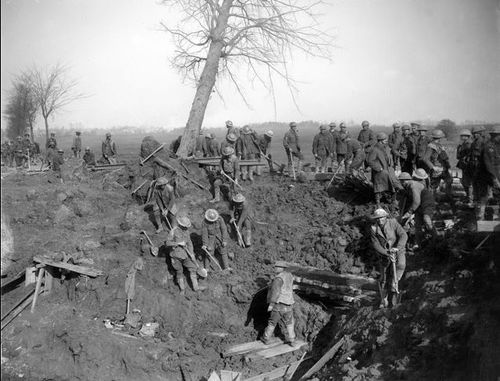2nd Pioneer Battalion
From Our Contribution
 | |
 2nd Pioneers clearing a road near Bapaume 1917 AWM E00343 | |
Contents
[hide]Brief History
The 2nd Pioneers were established on 10 March 1916, at Tel-el-Kebir in Egypt, and were subsequently assigned to the 2nd Division. Formed from volunteers drawn from the state of Victoria, the battalion consisted of four companies, under a headquarters company. They were engaged in every action undertaken by the 2nd Division, starting at Pozieres and Mouquet Farm in mid 1916 through Bullecourt and Third Ypres in 1917, the stemming of the German tide in the Spring Offensive of 1918, the "Peaceful Penetration" phase leading up to and including the Hundred Days campaign in late 1918.
Trained as infantrymen, they were also tasked with some engineer functions, with a large number of personnel possessing trade qualifications from civilian life.
The battalion's first major action was fought around the Pozieres heights in late July 1916, during which it suffered over 200 casualties during a two-week period. Despite the heavy losses at Pozieres, the pioneers subsequently took part in the Battle of Mouquet Farm in July and August 1916.
The following year, after the Germans withdrew to the Hindenburg Line, the pioneers were committed to a series of actions aimed at attacking these defences as part of Allied efforts to follow up the Germans. They participated in fighting during the Second Battle of Bullecourt in May, and the Third Battle of Ypres later in the year.
In early 1918, they helped to defend against the Spring Offensive. In August 1918, the 2nd Pioneers supported the Allied advance during the Hundred Days Offensive, which ultimately brought about an end to the war.
Their final action came around Montbrehain amidst the Battle of St. Quentin Canal in early October 1918. Prior to the battle, the 2nd Pioneers carried out bridging operations over the Somme, but later they were used primarily as infantry during the assault on the village due to heavy losses amongst the 2nd Division's infantry battalions earlier in the year. Later, the pioneers joined the "mopping up operations", taking up a position to the flank of the 21st and 24th Infantry Battalions, in what historian William Westerman describes as the "most successful use of Australian pioneers in a combat capacity in the entire war". Losses in this final attack amounted to 19 killed and 87 wounded. Their total losses for the duration of the war were 1,191 killed or died on active service and 4,147 wounded.
As personnel were repatriated to Australia in drafts as part of the gradual demobilisation of the AIF, the battalion's strength dwindled until finally it was disbanded on 18 May 1919 while in the Charleroi area of Belgium.
Battalion Personnel
- Reginald William Edwards 26 Apr - 5 Oct 1918
- Dugald Thomas Main 26 Apr - 30 Aug 1918 (WIA Mount St Quentin)
- Aubrey Walter (Swazz) Mead 16 Mar 1916 - 2 Feb 1918
- Charles Robert Merchant 12 Mar 1916 - 28 Jun 1917
Battle Honours
No battle honours were subsequently awarded to the 2nd Pioneer Battalion – or any other First World War Pioneer Battalion – as there was no equivalent unit to perpetuate the honours when they were promulgated by the Australian Army in 1927.
Individual Honours
- 3 Distinguished Service Orders and 1 bar, 1 second bar
- 16 Military Crosses
- 4 Distinguished Conduct Medals
- 73 Military Medals and 3 bars
- 7 Meritorious Service Medals
- 38 Mentioned in Despatches and
- 3 foreign awards
Notes
Content for the history and honours sections has come from a combination of Wikipedia and the Australian War Memorial websites.
For further detail about this unit's participation in the war, see:
- Anzac Pioneers - 2nd Pioneer Battalion AIF 1916 - 1919 by Neville Browning OAM